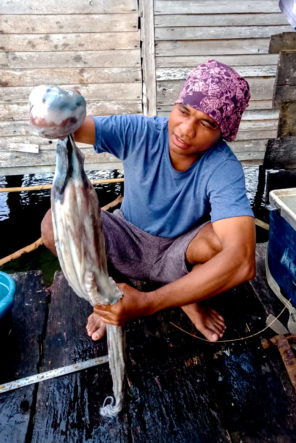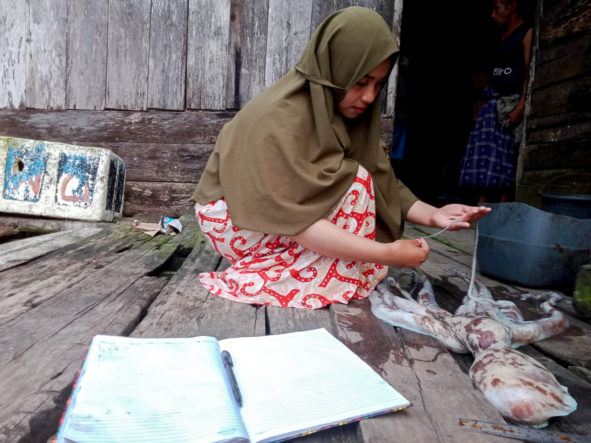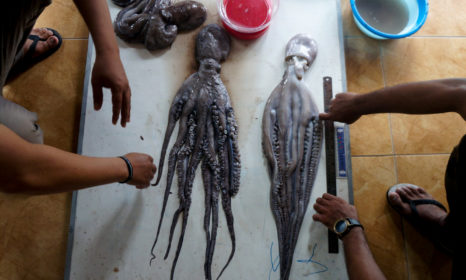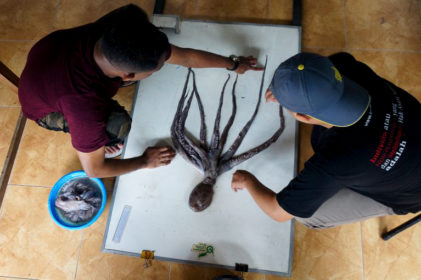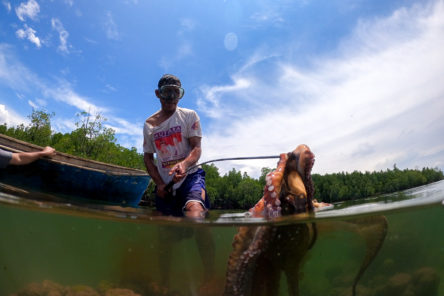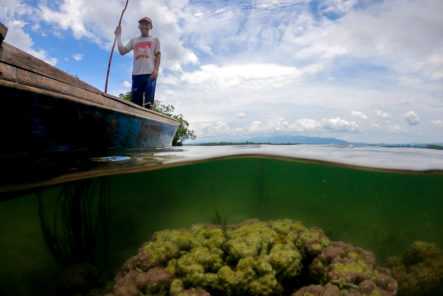This post is also available in:
 Indonesian
Indonesian
As we get ready for today’s activities, we prepare the main tools we’re going to need: a scale and a ruler and three large octopuses…
“Good morning, everyone!” I said, excited to start the day.
On my screen, I see friendly faces from our partner organsation, Japesda, who are eagerly awaiting today’s training session where we’ll role play the octopus data collection process, including learning how to sex an octopus. The training is designed to help Japesda trial a participatory approach to monitoring octopus catch data, which they plan to do with communities in Uwedikan Village, Luwuk Timur District, Banggai Regency, Central Sulawesi in the coming months.
Today’s session feels unusual – normally we would carry out training in the field alongside the community, but due to the COVID-19 pandemic, we have had to adapt our training approach and take it online. Myself and my colleague Indah are facilitating, whilst the Japesda team join the session remotely. There’s Chris, Japesda’s Programme Manager, Nurain, Japesda’s Director, two field staff called Jali and Iqbal, as well as four other staff members who are also participating.
Since the beginning of 2020, Japesda has been assisting the Uwedikan community on their journey to start managing their octopus fisheries. The Japesda team have shown octopus fishers in the village how important it is to collect data and record their octopus catches. Taking a participatory approach to fisheries monitoring can provide fishers with meaningful opportunities to understand and lead their own fisheries management efforts.
Once the Uwedikan community became interested in better understanding their resources, we encouraged them to participate in octopus fishery monitoring. Through the assistance of a data collector from the community Japesda supports, they started to collect data on their octopus fishery: the fisher’s name, the total catch, the weight of each individual octopus, the sex of octopuses and the fishing site,” said Nurain, Director of Japesda.
For data collectors and fishers alike, most of this data is easy to recognise and record, however, identifying the sex of an octopus is not necessarily something that comes naturally, which is why the first part of our virtual training session addressed just that.
How to sex an octopus
You can identify the sex of an octopus through three methods: by observing either the tentacles, mantles, or gonads.
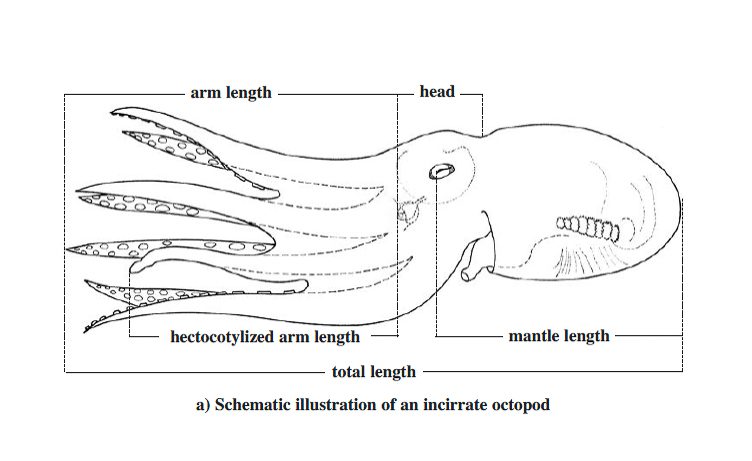
Diagram of an octopus | Credit: FAO
“Identifying octopus sex is not difficult. For me, finding a soulmate is much more difficult!”“Identifying octopus sex is not difficult. For me, finding a soulmate is much more difficult!” Jali, one of the Japesda field staff teased, after he’d successfully identified all three octopuses as males. He lifted the octopus, ran a finger from the centre point between the eyes and separated the tentacles.
Jali took the four tentacles on the left, counting from the centre outwards to the third tentacle. Following the third tentacle down towards the tip, he showed us that you see either a rounded tentacle end – for a male octopus to store and transfer sperm – or a tapered tentacle that looks similar to the other tentacles – this signifies a female octopus.
“We can also determine the sex of octopus by turning the mantle inside out. For a male octopus, you’ll see one white duct coming out from underneath the digestive system and going down the back of the head,” Indah added
“For a female octopus, there will be two oviducts coming out from behind the digestive system and going down the back of the head,” she continued.
But why sex an octopus?
Identifying the sex of an octopus is a crucial part of understanding their life cycle, as female and male octopus mature differently. In Australian waters, a male Octopus cyanea (the species most commonly fished in Indonesia) will mature at 5-6 months of age (and weigh around 0.35 kg), meanwhile females mature at around 7-8 months, weighing 1.35 kg. At the age of 9-12 months, female octopus will migrate to deeper parts of the reef to spawn.
For fishers, it is important to know the sex of the octopus they catch in order to maintain the reproductive balance of their octopus stocks, in the hope that their population will remain abundant in the ocean and continue to be a key source of food and income.
“The sex data of octopus caught by fishers will be important information if their communities want to begin discussing how to manage their octopus fisheries more sustainably,” Indah explained during the training.
With the data, the community will have the power to make decisions – if octopus catch decreases, they could, for example, decide to temporarily close an octopus fishery to give the female octopus an opportunity to breed so that they can safeguard octopus production in the future,” she added.
Simulating the data collection process
After the octopus sexing workshop, we moved onto the part of the training that Indah and I were most excited about: simulating data collection at the community level, which turned out to be particularly entertaining!
Through their participatory fisheries monitoring programme, Japesda will be working with two data collectors who are members of the Uwedikan community. Their roles are to collect octopus biology data (weight, mantle length, sex) and octopus fisheries data (fishing period, fishing gear, fishing method, total catch and fishing ground).
These data collectors will work with fishers and other stakeholders including local buyers, village government and neighbouring communities, to collect data on all of the octopus fishery activities in Uwedikan Village, in order to better understand the state of their octopus fishery and begin to make decisions around fisheries management.
Firstly, we rehearsed a scenario of what a data collector should do when fishers catch octopus. We decided to do the role play in the local language to make sure it was as authentic as possible.
Ismi, who acted as a data collector seemed a bit nervous, but she soon found her confidence, pretending to speak to a fisher who had just caught an octopus, “Hi sir, how are you doing? We’re here to collect octopus fishery data. Can you tell me when you started fishing today? Maybe you have a few minutes to chat about your catch today?” Ismi asked.
After this, we simulated a zero catch scenario, which is when a fisher comes back to shore without any octopus. This time the process was slower but rather funny, as Franco, who was playing the role of a fisher, teased the data collector by pretending that he couldn’t hear them.
Even in a zero catch scenario, it is vital that data is still recorded, because the fisher has put in effort (time, energy and logistics) to fish.Between the giggles, the important message was received; even in a zero catch scenario, it is vital that data is still recorded, because the fisher has put in effort (time, energy and logistics) to fish. If the data shows that fishers are putting increasing efforts into fishing, but with no results, this signifies that the stock is decreasing and therefore can inform communities that they need to make changes in the management of their octopus fishery.
After two hours of activities, we finished our training session with big smiles on our faces. The next step will be the real test, when Japesda begins the participatory monitoring of octopus fisheries together with the community in Uwedikan Village.
Virtual technical support can still be fun!
For the last six months, we have been adjusting our way of working to support our partners across Indonesia. We’ve found that virtual sessions are the best way to deliver technical support and learn from our partners about what’s happening in the field.
Initially, we thought it would be a real challenge; although we regularly have virtual meetings with our global team, supporting partners requires more than just a chat on Google Meet. Technical support requires a clear facilitation process and a back and forth of interactive and engaging communication. Whilst we are constantly working to improve the support we offer, online technical support has become our new normal, and we’ve found that we’re still able to facilitate potentially complex training – like how to sex an octopus!
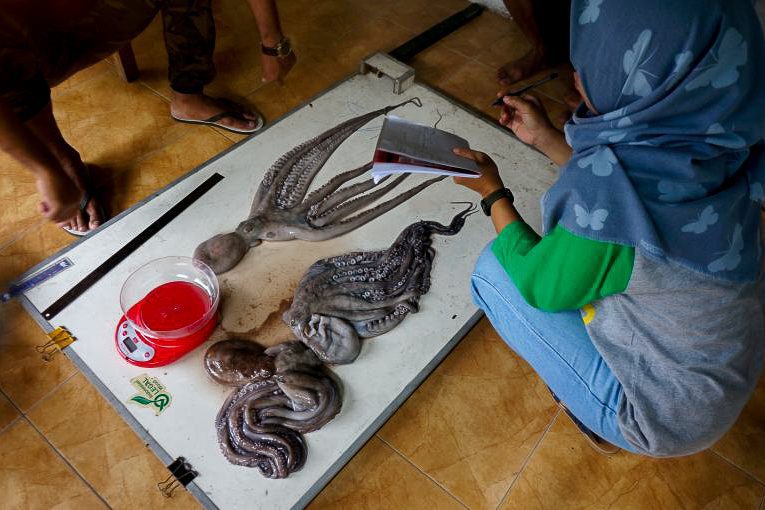
The Japesda team honing their octopus monitoring skills | Photo: Christopel Paino | Japesda
What has made the whole process much easier, is our partners’ eagerness to learn.What has made the whole process much easier, is our partners’ eagerness to learn. Take Japesda for example; following our workshop, they are now equipped to train their team and community members on how to sex an octopus and can teach them the most effective ways to collect octopus fisheries data – they’ve even written a blog about it!
A virtual training session requires a camera phone, a computer, a projector, some data collection equipment and maybe even a few octopuses. But most importantly, we’ve learnt that taking our support online requires two key elements – the curiosity and enthusiasm of our partners, which as they show us all the time, they have in abundance.
Find out more about how Japesda are supporting fishing communities through the COVID-19 pandemic
Learn about why marine management pays for small-scale fishing communities across the coastal tropics


